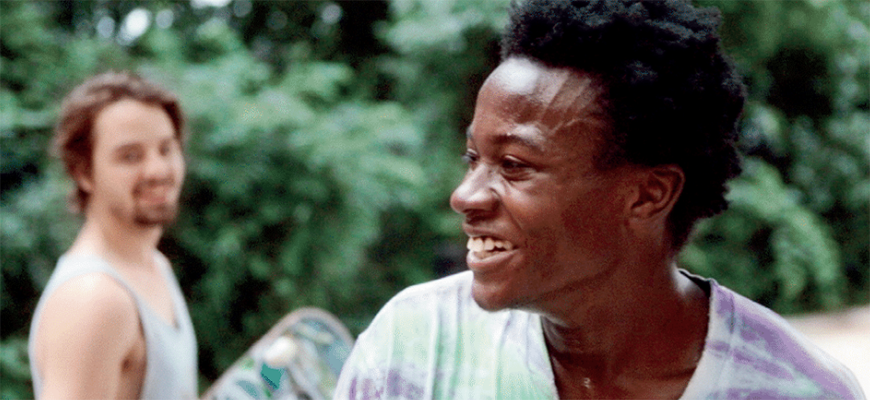The following is an advanced review of Minding the Gap, playing DOXA Documentary Film Festival on Monday, May 7 and Tuesday, May 8. More information here.
Minding the Gap follows the lives of four young friends through the transitional years from skateboard-bound teens into adulthood, using this particularly small sample to explore the awkward and difficult existential questions we all face growing up.
The documentary is deceptively simple in execution. Directed by Bing Liu, the film consists of casual interviews turned conversations intercut with montages of skateboarding and other details from his own childhood and those of his close friends Keire, Zack and Zack’s on-and-off girlfriend, Nina. Growing up in small and financially hopeless Rockford, Illinois, the film initially seems to focus on the escape that brought their lives together — skateboarding. It begins with the rebellious din you’d expect from any documentary with such a focus: hang on to your youth while you have it, ditch your shitty parents to ride at the local park, fall and get back up again. In the words of Zack, “Drink beer, listen to punk rock, smoke a joint. Fuck it.” While nostalgic, it seemed like shallow waters at first, but the film quickly transforms into something far more real and ultimately moving. The documentary explores the awkward and difficult existential questions we face growing up — How do we define the people we want to be? What are the expected and unexpected turns that steer us off course, or perhaps force us back on it. And when life hands us the worse, or maybe just the real, what do we do to escape? How do we cope? From the shortcomings of parenthood to disciplinary violence, the film does a particularly awesome job of taking a private and ultimately mundane story, and opening up the broader and more public discourse of breaching adulthood.
Liu was thoughtful and considered in the filming and editing of Minding the Gap. Every shot of the film feels intentional and necessary, and even the high energy skateboarding scenes take on a more meditative tone as they are paired with the twinkling piano that makes up the majority of the score. Liu should also be commended for his dedication to the multiple years it took to gather the footage, and for his foresight to start collecting it so early on. The documentary was mostly shot in what appears to be about a five year span, though age is never specified. I suspect this was done purposefully; by removing the exact ages from the equation, you can truly witness the ripening of the story through the dialogue. It’s this care to document a period of time with such focus that truly sets Minding the Gap aside from other coming-of-age stories. Though the central topics are difficult and revelatory, such as domestic violence and existential guilt, Liu’s direction maintains a tender and sympathetic tone throughout. Even at the film’s climax, a confrontation between two subjects with complex experiences of domestic abuse, there is never a moment where Liu extends an accusatory finger. His focus is clear; he is inquisitive and compassionate, constructing a story that does not boldly set wrong from right, but rather explores the way in which circumstance can beget impact. The cracks in the pavement that throw us down and the fortitude or fluke that allows us to get back up again.
One of the most rewarding moments of the documentary is the way in which skateboarding takes on the role of a wonderful metaphor rather than the true focus of the film. The subjects’ relationships with skateboarding is therapeutic in ways one wouldn’t initially expect — skateboarding is the perfect excuse to run away from home and to feel free and to rebel, but it also serves as a constant reassurance that control and the means to survive are within grasp. As you see it scrawled on Keire’s freshly broken board during one of the film’s many montages, for them, “this device cures heartache.”


